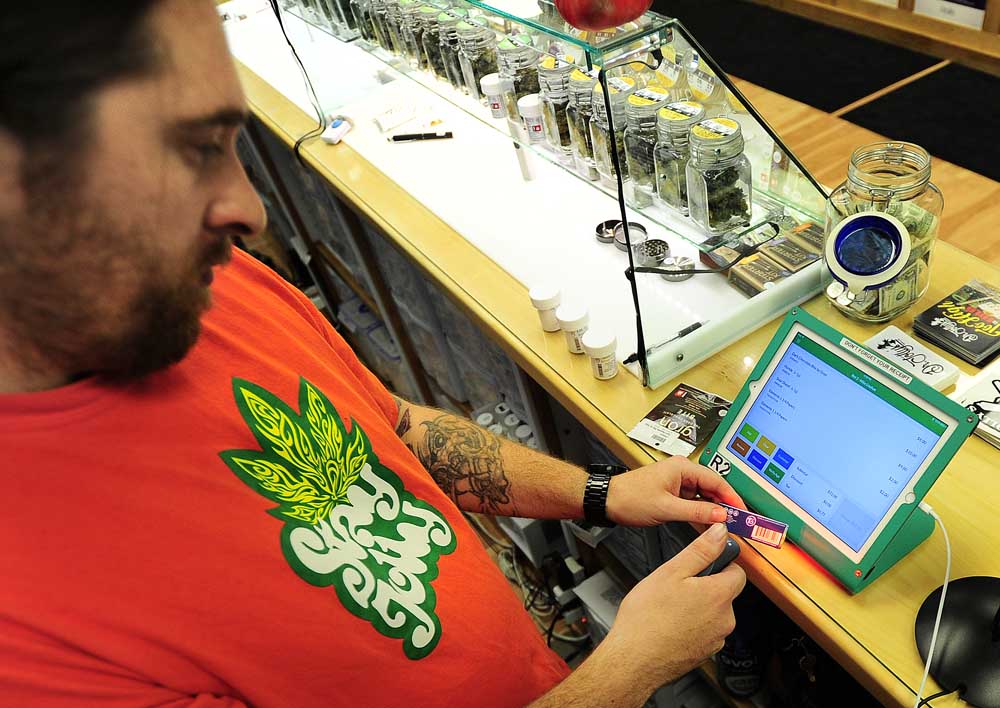New strain of tech tools emerges for marijuana trade
Published 12:00 am Sunday, November 13, 2016

- Mike Linehan scans in a product while working at Dr. Jolly's in 2016.
In many ways, Dr. Jolly’s marijuana dispensary is like any other retailer.
On Wednesday, a busy afternoon in the shop on SE Third Street in Bend, co-owner Damon Hebert was overseeing product photography in the back office, prodding clerks to help waiting customers and making sure promotional fliers went into take-home bags.
The tech tools that he uses to operate and market the business are similar to those in use in mainstream retail, yet they’re drawn from a parallel universe of vendors. From the beginning of marijuana legalization, investors have been drawn to companies that supply the producers and sellers with things they need to do business. While a few tech products have landed millions of dollars in backing and cemented an early lead, industry players and investors say there’s still plenty of room for innovation and competition.
“We’re barely out of the first inning in this industry,” said Patrick Rea, CEO of the Colorado-based cannabis startup accelerator CanopyBoulder.
Dr. Jolly’s is listed on Leafly, an app that’s often described as the Yelp of cannabis. And Hebert recently invested in point-of-sale software that will automate the chore of reporting inventory data to the Oregon Liquor Control Commission. When Dr. Jolly’s becomes a recreational pot shop in December, every cannabis item that comes through the store must be reported to the state’s seed-to-sale inventory tracking system, Metrc.
“We never would’ve switched if it weren’t for the Metrc integration,” Hebert said.
The new software, Greenbits, costs several hundred dollars a month, he said. Repeated across hundreds of dispensaries in Oregon, Washington, Alaska and Colorado, point-of-sale software represents a multimillion-dollar revenue opportunity. And that will multiply now that California, Massachusetts, Maine and Nevada have voted to legalize marijuana.
In addition to point-of-sale systems, Rea said there are opportunities for new paid marketing platforms because the go-to tools for most small businesses, Facebook and Google, aren’t available to anyone who handles marijuana. He also thinks there could be more competition among inventory-tracking systems, now dominated by Metrc’s creator, Franwell, and BioTrackTHC. Both companies are based in Florida and bid on a five-year contract with Oregon.
The OLCC awarded a $3.6 million contract last year to Franwell. In addition, each licensee pays $40 a month in service fees.
If marijuana businesses are ever allowed to access traditional banking, there will be a rush to develop software that integrates credit card processing with the rest of the business, said Don Morse, president of the Oregon Cannabis Business Council. “That’s the single biggest new frontier,” he said.
Greenbits, the Portland-based company supplying Dr. Jolly’s new point-of-sale system, is one of 18 companies authorized to tie into Metrc and integrate the data with its own system. Their products are at various stages of development, and many of them are not ready for prime time, said Kale Gray, a co-owner of the Tokyo Starfish dispensary in Bend.
Gray, who started searching for a new point-of-sale system over the summer, said he met with a few vendors in Portland, most of whom were working out of coffee shops. And they had yet to find solutions to situations that arise in day-to-day dispensary operations, he said. Gray, too, opted for Greenbits because it’s deployed in more than 200 stores and, he said, “Greenbits has an office.”
Only seven of the 18 companies approved to integrate with Metrc are based in Oregon, and only one of those is based in Bend. CannaFo.com, an everything-about-marijuana website, has also created Cannafo Connect, a feature that allows marijuana producers, dispensaries and consumers to see what products are available and where.
Consumers can use Cannafo Connect to place preorders at participating dispensaries, guaranteeing the product they want will be available for pickup and payment later.
With the Metrc and Greenbits integration, CannaFo engineer Josh Pardee said, the information at Cannafo.com will be updated within minutes of a transaction. “That’s where you start to get that perfect world,” he said.
Pardee hopes that eventually dispensaries will pay $250 a month for premium business listings at Cannafo Connect, but right now it’s a free feature used by 19 dispensaries.
Despite its thriving software startup scene, Oregon hasn’t produced many marijuana-focused tech companies, Rea said. That’s because the recreational market here is still new, and it’s enough for marijuana producers and sellers to exist, he said. Once the market matures, those businesses will start looking for ancillary software to give them a competitive edge, he said.
Software vendors can easily adapt their products to different state regulatory frameworks and sell across state lines, Morse said.
“Those type of ancillary systems are not going to pop up with each state,” Morse said. “Colorado got all that because they were the first.”
Rea doesn’t believe first means best when it comes to software. “Google wasn’t the first search engine,” he said. “There are going to be many, many opportunities to do things better.”
The Bend startup Cannafo is fighting an uphill battle to overtake Leafly, backed by the Seattle private-equity firm Privateer Holdings, in search rankings, Pardee said. While Leafly is a one of the go-to apps for consumers looking for reviews and information about marijuana strains and dispensaries, it’s a source of complaints for pot shop owners, he said.
Retailers pay $1,000 or more each month for prominent placement in the Leafly app, said Morse, who also owns the Portland shop The Human Collective. “There just isn’t enough competition in the industry to make fair pricing,” he said. “People are happy just as long as they’re willing to do business with a cannabis business.”
Pardee is trying to create a breadth and depth of detailed information that will make Cannafo a go-to site for all things marijuana. The startup, owned by Bend entrepreneur Kelly Martin, is also spending tens of thousands on sponsorships at industry events and advertising in places like Dope magazine to elevate its profile with marijuana users, Pardee said. Once Cannafo gains a significant amount of traffic and users, it will be a viable, cheaper alternative for dispensaries, he said.
One downside to software startups is they can take years to produce revenue, said Jack Robson, a veteran software developer in Bend who started High Desert Pure, which produces marijuana extracts. Robson, who also owns a custom-app development firm, said he’s spent a couple of hundred thousand dollars on the business. “We could’ve spent less money and done software,” he said. “But the difference is we’ve been able to sell product while we’re making it.”
And he’s seeing new opportunities for technology on the production side. “We’re working on software to automate the manufacturing process,” Robson said. “That may be something we sell.”
— Reporter: 541-617-7860, kmclaughlin@bendbulletin.com,






